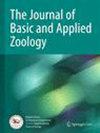The silkworm Bombyx mori cuticular protein CPR55 gene is regulated by the transcription factor βFTZ-F1
Abstract
The insect cuticle is composed of various proteins and formed during the moult under a complex biological process that depends on the cross talk between hormone levels and gene expression. In the present study, we aimed to clarify the ecdysone-dependent temporal regulation mechanisms of cuticular proteins expression and the underlying control of Bombyx mori metamorphosis. The expression of CPR55 was observed from the W3 early stage and peaked at pupation when the ecdysteroid titre declined. CPR55 was induced by the ecdysone pulse, and their expression peaked at 24 h after transfer to a hormone free medium. Transcripts of CPR55 were neither observed after the 20E pulse treatment in the presence of cycloheximide nor after the addition of 20E in V4 wing discs. We analysed the upstream region of the CPR55 gene using a transient reporter assay with a gene gun system which identified only one βFTZ-F1 binding site important for cis-acting elements for the transcription activation of the luciferase reporter gene by an ecdysone pulse. Site-directed mutagenesis of this element in the context of the 589-bp promoter fragment drastically decreased the reporter activity. The nuclear protein bound to βFTZ-F1 sites was identified by an electrophoretic mobility shift assay suggesting that CPR55 expression was regulated by βFTZ-F1 through the ecdysone pulse. The results confirmed that transcription factor, BmβFTZ-F1, binds to the cis-regulatory elements in the promoter of the gene coding for cuticle protein, CPR55, and regulates its expression during B. mori metamorphosis.

 求助内容:
求助内容: 应助结果提醒方式:
应助结果提醒方式:


